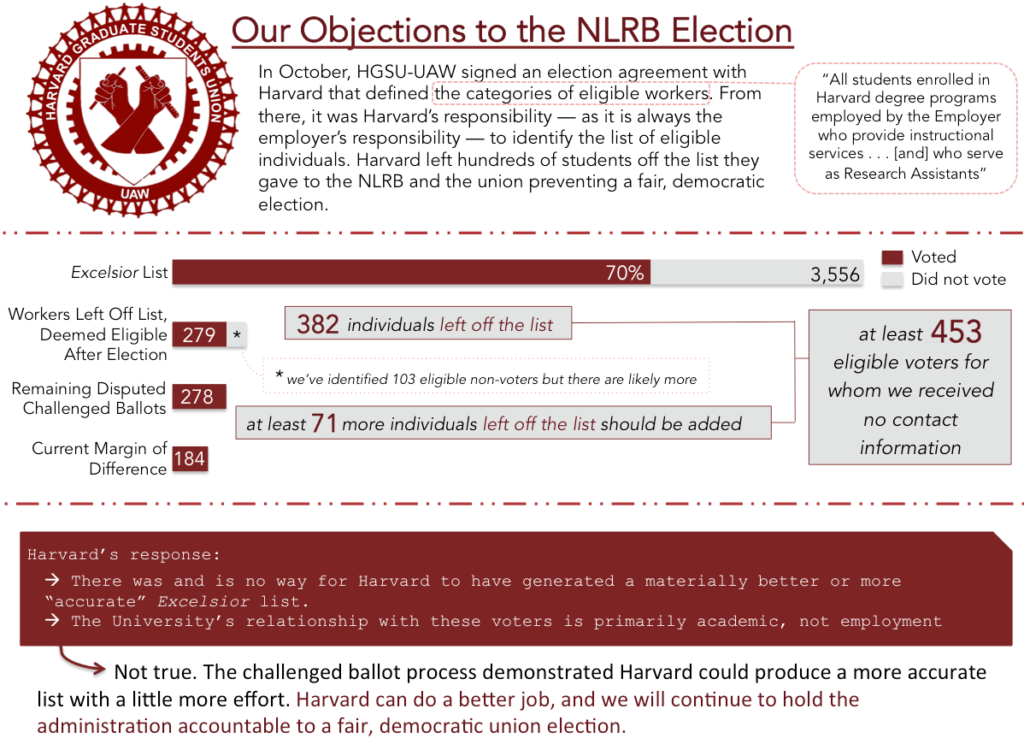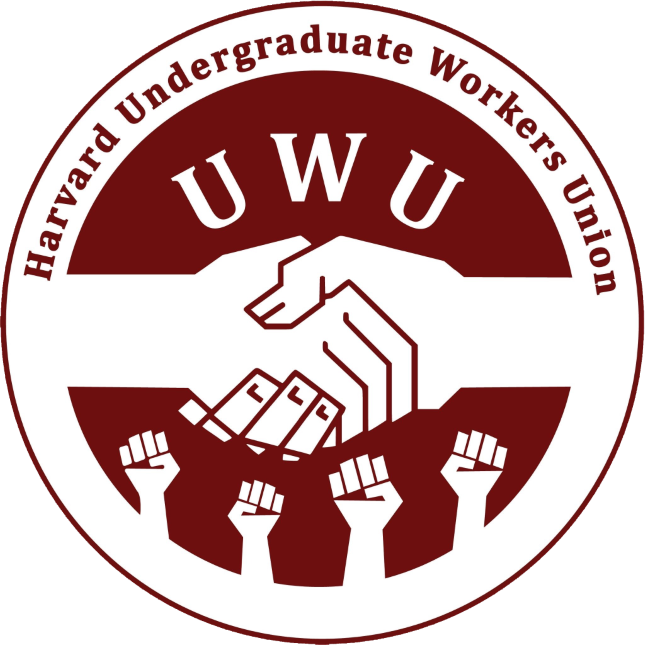The law requires that the voters are only those employed or who have been employed within the proposed bargaining unit. Graduate students not currently employed as Research Assistants or in instructional roles are not yet university employees and therefore not eligible to vote under the law. This is why our messaging has always been: if you are a student worker, you are eligible and should vote. The NLRB does not provide a “look-forward” model for voting based on future employment (although anyone who works in the future will then be protected by the union); instead, the eligible voters are a snapshot of the university employees at that moment.
No. Instead we agreed to the categories of eligibility: “All students enrolled in Harvard degree programs employed by the Employer who provide instructional services at Harvard University… and all students enrolled in Harvard degree programs (other than undergraduate students at Harvard College) employed by the Employer who serve as Research Assistants.” It was Harvard’s legal responsibility, as only the employer has payroll information, to use these categories to create an eligible voter list and provide it to the NLRB and the union.
It does not matter whether the university did this intentionally; what matters is the effect of the list problems on the election. Harvard’s actions caused unnecessary confusion and problems. For example, from the beginning of this process until the last day of the election, the administration said all G1s and G2s in the DMS are not eligible to vote, regardless of lab assignments. Only after the election was over, did they change their position. What this demonstrates, once again, is the need for oversight and accountability on how the university manages its thousands of student workers. Harvard failed to do what employers, even big ones, do all the time: print a list of employees.
No, but these problems are still significant and troubling. The university’s policy to include preferred names on the Excelsior list, while requiring an ID with a legal name to vote, caused much unnecessary confusion. The policy was particularly frustrating to international students who list nicknames in Harvard’s system. We spent countless hours matching names on the voter list to individuals who voted, but this work has been completed and does not affect the objections.
No. We are happy that these eligible students knew to vote and we spent much time before the election encouraging any we could find who were degree-enrolled students working in instructional roles and as Research Assistants to vote. At the same time, due to the inaccurate list, we also know that there were hundreds of student workers whom we did not have the ability to contact in order to have conversations with them about the union. That some students who were wrongfully left of the list did vote has no bearing on the fact that the university failed to provide an accurate Excelsior list to the union.
There is no legal requirement for the employer to change the list prior to the election. Filing objections to the election is the only legal method for the union to resolve list problems. In the days before the election, we heard from many students that they had been excluded from the eligibility list, even though they were currently working in a research or teaching position. We encouraged everyone in a degree program who was currently working to vote. We pointed out to the university in advance of the election many of the problems with the list, but they chose not to make any changes.
GSD TAs are among the remaining challenged ballots whose eligibility is disputed. Like all other schools at Harvard, the GSD employs “Teaching Assistants” who provide instructional services to students. This is a covered position in our election agreement. The administration, however, claims that “The GSD uses the job title ‘Teaching Assistant’ in an anomalous way compared to the rest of the university” and that these students do not provide instructional services. Of course, all of Harvard’s graduate programs have unique elements, but GSD TAs provide instructional services to GSD students in a manner suited to the project-based, hands-on learning provided by the GSD. Their votes should be counted.
“Lookback” voters refer to student workers defined by our election agreement: “Doctoral students who have been employed in the bargaining unit for at least one semester during the past academic year and who are not currently in their Dissertation Completion year (or final year of their program).” We have always maintained that these voters should be eligible, just as they were in the Columbia University election. The NLRB has established that academic workers who take a semester off before returning to work in the following semester are part of the same community of interest as those employed during that semester. Harvard disagrees, arguing “there is no pattern or cycle that would predict whether these students are likely to serve in a bargaining unit position at some future point in their limited period of enrollment.” Of course there is. Many of these individuals are currently teaching this spring semester. Anyone who’s taken or considered a term-time fellowship knows that there is a clear pattern of returning to a semester of work. Their votes should be counted.
Because no accurate eligible voter list exists, this question is difficult to answer. We know that 2,241 people voted without challenge, 222 voted under challenge who matched to individuals on the Excelsior list, and 279 of the people who were not on the list and voted under challenge should have been eligible (as the employer now concedes). Beyond that, there is an indefinite number of voters who should have been eligible under the same criteria but didn’t vote. Assuming resolution of some of the remaining challenge ballots, the minimum number of eligible voters is 4,144 and the maximum number of voters who cast ballots is 2,938. This would make the highest estimate for voter turnout 70.9%, though it’s likely a few points lower.
We want a fair, democratic election. The failure of the university to provide an accurate list meant that this election was not one. We expect the NLRB to recognize these facts, set this election aside, and call for a new one. In our conversations with student workers across the university, people talk about the need for protections from discrimination, child care subsidies, improvements to health care or dental, job security, etc. Whether this election is set aside or not, we will continue to work towards a collectively bargained contract in which we increase pay, improve health benefits, ensure stronger protections for international and minority students, and make a more democratic Harvard.



